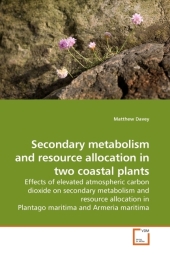 Neuerscheinungen 2010Stand: 2020-01-07 |
Schnellsuche
ISBN/Stichwort/Autor
|
Herderstraße 10
10625 Berlin
Tel.: 030 315 714 16
Fax 030 315 714 14
info@buchspektrum.de |

Matthew Davey
Secondary metabolism and resource allocation in two coastal plants
Effects of elevated atmospheric carbon dioxide on secondary metabolism and resource allocation in Plantago maritima and Armeria maritima
2010. 236 S. 220 x 150 mm
Verlag/Jahr: VDM VERLAG DR. MÜLLER 2010
ISBN: 3-639-23060-4 (3639230604)
Neue ISBN: 978-3-639-23060-4 (9783639230604)
Preis und Lieferzeit: Bitte klicken
This PhD thesis investigates the physiological and biochemical responses to atmospheric carbon dioxide and soil nitrogen availability in the two coastal plants Plantago maritima (Sea Plantain) and Armeria maritima (Sea Pink, Thrift). In response to drought, Sea Plantain accumulates the carbon-based compatible solute sorbitol, whilst Thrift accumulates the nitrogen-based solutes betaine and proline. It was hypothesised that these contrasting metabolic responses will cause a species-specific response in the resource allocation of other metabolites. This thesis presents data on biomass, leaf gas exchange (photosynthesis and transpiration), water potential and carbohydrate concentrations showing how Thrift was more responsive to changes in C and N availability than Sea Plantain. This thesis also examines resource allocation to other major C and N sinks, the soluble proteins and phenolic metabolites and structural compounds such as lignin. As well as the presented data, this thesis details the range of physiological and biochemical techniques such as mass spectrometry required to carry out such experiments, and answer important biological and ecological questions, on wild plants.
Dr Matthew Davey is a plant physiologist. After completing his PhD on coastal plant metabolism at Durham University he worked at the University of Sheffield specialising in metabolomics to investigate plant responses to environmental change. He is now carrying out research on algae at the Department of Plant Sciences, University of Cambridge.


